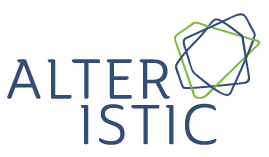Friendships
iven the amount of time that we, as trainers at Alteristic, spend together on the road, it might not come as much of a surprise that we are pretty close. We know a lot about each other – our food preferences (to ensure we’re finding the perfect restaurants in a city we’ve likely never been to before); our post-training routine (does my colleague like to go to dinner right away because they’re “hangry” after a day in front of a training room? or would they rather get a pre-dinner workout in? or are they likely to find the best local happy hour?); and we know a lot about our hobbies, passions, and families (when you regularly spend a whole week together, you have lots of time to talk about all the things). We celebrate our personal and professional accomplishments and we find comfort in each other when life is tough. Between these simple moments, along with what we share with each other through our personal connections to the issue of violence prevention, it is no wonder that we are connected to one another’s humanity in a very profound way.
Now, I know not everyone has the same work environment as we do, but chances are, everyone that’s working in the field of prevention isn’t doing it alone. Perhaps you have a robust office of employees in a space that’s just a little too small. Maybe you’re a one-person office who has made connections across departments. Some folks might be like us and are on the road all the time, therefore looking for those deeper connections to their colleagues who they don’t see as often.
A recent Gallop study found that there is a “concrete link between having a best friend at work and the amount of effort employees expend in their job.”1 Friendships at work may contribute to a greater well-being, a connection to our team where we want to see each other succeed, and increased communication and collaboration among peers. We all know that we’re more likely to go above and beyond for the people that we’re connected to the most. What this boils down to is, relationships matter.
Since many of our Senior Trainers live remotely and only see each other when we are on the road, it’s easy to start missing one another. We often just schedule “catch up” video meetings to reconnect with no purpose or agenda – and it’s encouraged! What do you do to foster your work relationships? Is there an opportunity for catch up meetings, or happy hours after work, or a quick walk together to your next meeting where you can talk about anything and everything (other than work)?
All of the things that I’ve mentioned in my previous blog posts about Hope and The Power of Positivitycan also be connected to our relationships. For example, I know that when I’m feeling in a rut, I can go to Sirajah for creativity, or Alberto for a great music playlist, Amanda for her comedic genius, or Melissa for a good belly laugh. All of our colleagues offer different perspectives and talents and strengths and we cherish the time we spend learning from one another.
Friendships matter; and as we work together to bring folks to the table when it comes to prevention, we could all benefit from leaning on a good friend every once in a while. Who are you connected to as you fight for social justice? Who do you lean on when your hope reserve gets low? Who’s the best lunch date when you need to get out of the office?Who can you depend on to give you feedback and encouragement as you learn and grow in this field? Who makes you laugh? Who makes you a better person?
As Amy Poehler said, “find a group of people who challenge and inspire you; spend a lot of time with them, and it will change your life.”
I certainly have countless people who have changed mine. And for that I’m truly grateful.
1http://news.gallup.com/opinion/gallup/225107/why-need-best-friends-work.aspx





